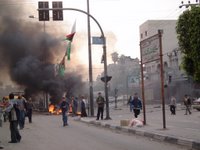
As '06 dawns, the Palestinian territory has degenerated into near-total anarchy
By Rafael D. Frankel
GAZA—As the first new year devoid of an Israeli presence dawns in Gaza since 1967, armed militias roam the streets freely, foreigners are kidnapped with regularity, and the measure of a man in this coastal territory is not his political title, or even the size of his house, but the number of M-16 and AK-47-wielding thugs he employs as bodyguards.
When Israel left Gaza, full control over its 1.3 million people was ostensibly transferred to the Palestinian Authority. But instead of asserting its newly granted jurisdiction, the PA has let this coastal territory deteriorate to such a state of anarchy that the best-armed gangs or families make law at the point of gun.
Speaking to reporters who had to pass through some 30 armed guards to get to his press conference, PA Police Chief Allah Housni on Friday said the PA was stepping up its security efforts in Gaza. “The police will make sure to stop all the acts,” Housni said, referring to the general lawlessness. As he spoke, gun fire echoed in the background and two PA snipers stood tensely at the windows of the second-story police station room.
Housni also condemned the rocket attacks emanating from the former Jewish settlements in northern Gaza. “Gaza is free now and we don’t want Israel back,” he told The Post, adding that the PA will deploy forces in those areas in order to halt the rocket fire.
But few in Gaza—let alone Israel—believe Housni and the PA will back up their words on any account. (Later in the day, a rocket fired from Gaza hit near Ashkelon, prompting Israeli retaliatory shelling.)
Earlier in the day, 100 gunmen stormed the same border crossing where the Burtons were abducted, temporarily shutting down the terminal and sending its European monitors fleeing to the nearby Kerem Shalom Israeli army base.
The incident was the continuation of a family feud that claimed two lives Thursday and a 14-year-old boy caught in a cross-fire Friday. He was killed at a protest in front of a police station where men and teenagers lit tires ablaze in the middle of the streets, scuffled with police, and chased down reporters who tried to photograph the mayhem.
“Yassir Arafat left a terrible legacy of violence behind him where people are always acting outside the law,” said Eyad Sarraj, a long-time political analyst and the president of Faculty for Israeli-Palestinian Peace. “Now with him gone, everyone is fighting for his power.”
All throughout the days here gun shots ring out. From time to time, explosions from home made bombs, rockets and the countering Israeli artillery fire echo through the graffiti-ridden streets.
With Palestinian elections coming in January, the violence has heightened as the different armed factions jostle for control. Having seen the results of PA governing, many people here say they will vote for Hamas because they believe it can deliver the quiet they so desperately crave. They are also grateful for the social services it provides and admire the struggle it has waged against Israel.
PA Chairman Mahmoud Abbas “is impotent. He has no guts… He is a paralyzed leader,” said Sarraj, who is running for the Palestinian parliament on a human rights and law and order platform. “Hamas looks honest and disciplined and its people are ready to die for its cause.”
Where the rocket fire on Israel is concerned, Sarraj sees a Syrian connection. “It’s a game,” he said. “You play against me in Beirut, I play against you in Sderot and Ashkelon.”
Sipping Arabic coffee in his home, guarded by three gunmen, a spokesman for a faction of al-Aqsa Martyrs Brigade agreed that the rocket fire was a political move more than an aggression against Israel. But, said the spokesman who gave his name only as Abu-Jamal, it was a move made by Islamic Jihad because they are the only prominent faction not running in the Palestinian Legislative Council elections. Abu-Jamal denied his group’s involvement in the rocket fire, and also condemned it.
Whomever they are supporting, the goal of most Gazans is to bring some semblance of normality back to their streets, Abu-Jamal said. But admitting his own part in it, he added that “anyone who wants to do anything just takes guns with them.”
Though much of the violence here stems from political power plays, the aggressive disposition has seeped its way into the most benign places.
What was seemingly a small argument over a soccer game on Friday turned into a near-brawl next to a field in the middle of the city. One man threatened another with a sledge hammer he collected from his nearby yard before two dozen men who joined in the altercation and shouted him back into submission.
Taking in the scene from his car parked next to the field, a Palestinian journalist who wished his name withheld said such incidents are common place. “Aggression and frustration is everywhere in Gaza now,” he said. “You can feel it in the air all the time.”
©2006 Rafael D. Frankel & The Jerusalem Post

No comments:
Post a Comment